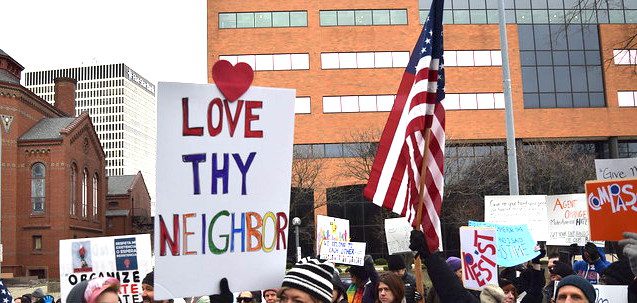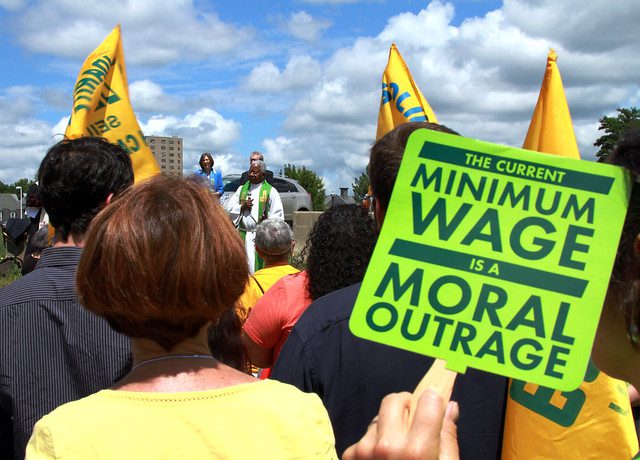
Image by Geoff Maddock, via flickr, CC-BY-2.0
It may still sound radical in (much of) the United States to advocate for rent control, but just for perspective, thousands of people recently marched in Berlin demanding the re-nationalizing of any apartments that have been sold off to landlords who own over 3,000 units. And they are collecting signatures for a ballot proposal. We’re not saying that’s the best answer, but we’re saying it’s clear the range of debate can be a lot wider than it usually is here.
They’re still getting bigger. The largest bank merger since the 2007-2009 financial crisis is in the works, a proposed purchase of SunTrust by BBT. The combined bank would be the 6th largest bank in the country. As with many mergers, community Reinvestment advocates are concerned about branch closures and fair access to credit. Two public meetings on the merger are upcoming, and the comment period deadline has been extended.
Power in Numbers. An interfaith organization made up of more than 20-member congregations in Indiana is focusing its efforts on getting more funding for affordable housing, and pushing for better mental health practices. Hundreds of the group’s members gathered during the organization’s annual rally to discuss issues that are most pressing for the community at large, and the lack of affordable housing was a sticking point. The organization—Congregations Acting for Justice and Empowerment, or CAJE—won $50,000 for the city’s Affordable Housing Trust fund last year, and will request that city leaders implement a yearly funding stream to the lack of affordable housing.
Doing for ourselves. As Lisa Rice from the National Fair Housing Alliance has written about in Shelterforce, one of the persistent legacies of redlining is a bifurcated financial system, with neighborhoods of color often having fewer mainstream, competitively priced financial services and more high-cost, predatory types of companies. One group of residents in North Minneapolis has decided to do something about this by organizing a Black-led credit union—and they’ve gotten the city to invest. Cooperatives have a long history in communities of color and seem to be gaining ground.
Somebody doth protest too much. When a Washington Post editorial questioned the motives behind HUD’s pursuit of a case against Facebook for having allowed racial discrimination in its housing ad targeting, Secretary Carson got his feelings hurt, and wrote a response defending his commitment to fair housing. Now, we’re actually glad Facebook is facing some consequences (even though it did FINALLY agree to stop the targeting, it sure dragged its feet about it), but we also agree with the legions of eye-rolling advocates who have responded as Diane Yentel of the National Low-Income Housing Coalition did to Carson’s indignation by running down the list of highlights of non-fair-housing-supportive things Carson’s HUD has done. By their fruits and all that.
Reimbursing CDCs? Will the American Medical Association and UnitedHealth Group make it easier for community-based organizations to be reimbursed for addressing the social determinants of health? The two organizations have proposed adding almost two dozen new billing codes that would provide reimbursement to health insurers for services like food and nutrition. The organizations hope that by “combining traditional medical data with self-reported SDOH data, the codes trigger referrals to social and government services to address people’s unique needs, connecting them directly to local and national resources in their communities.”
The luxury of hindsight. Nonprofit leaders and philanthropists including Rip Rapson from the Kresge Foundation and Tonya Allen of the Skillman Foundation (but previously a nonprofit leader in Detroit), had a frank conversation at an Association of Black Foundation Executives panel about whether their efforts to “save” Detroit during its bankruptcy might have been a bit short on the democracy and community input fronts. (That was certainly a major critique at the time.) From this write-up they seem to feel that they were, but did not have a clear answer about what would have worked better.
Making Moves: “She’ll kick anti-displacement strategies into high gear and open doors of opportunity to people who are struggling,” says New York Mayor Bill de Blasio of Vicki Been, who was named the city’s new deputy mayor for housing and economic development. Been, who serves as the director of the Furman Center, will take on her new role in May. We’re big fans of Been, and we recently chatted with her and a roundtable of other important folks to chat about what we actually know about displacement. If you haven’t checked it out yet, you should. It’s a thoughtful and important read.




Comments